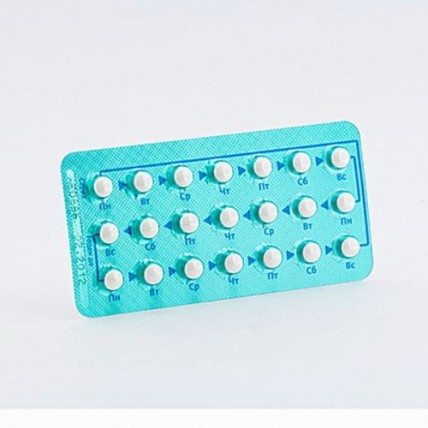Jeanine® (Ethinylestradiol, Dienogest) 21 tablets
- $40.00
What is Jeanine® (Ethinylestradiol / Dienogest)?
Jeanine® is a combined oral contraceptive specifically formulated for women of reproductive age. It contains two active hormones: ethinylestradiol, a synthetic form of estrogen, and dienogest, a synthetic form of progestin.
Each tablet of Jeanine® provides 0.03 mg of ethinylestradiol and 2 mg of dienogest.
This combination of hormones works in several ways to prevent pregnancy, making it a reliable choice for birth control.
The primary mechanisms include inhibiting ovulation, meaning the ovaries do not release an egg, and thickening the cervical mucus, which creates a barrier to sperm, preventing fertilization.
How Does Jeanine® Work?
Jeanine® achieves its contraceptive effects through a multifaceted approach:
Inhibition of Ovulation: The hormones in Jeanine® suppress the normal cycle of hormone release that leads to ovulation. Without ovulation, there is no egg available for fertilization, effectively preventing pregnancy.
Alteration of Cervical Mucus: Dienogest, one of the active ingredients, thickens the mucus in the cervix. This thickened mucus acts as a physical barrier, making it more difficult for sperm to enter the uterus and reach any egg that might have been released.
Endometrial Changes: The lining of the uterus (endometrium) is altered by the hormones, making it less receptive to a fertilized egg. Even if fertilization does occur, the egg is less likely to implant and develop.
High Efficacy: When taken as directed, Jeanine® is highly effective, with a Pearl Index of less than 1. This means fewer than 1 in 100 women using Jeanine® correctly over a year will become pregnant.
What Are the Benefits of Using Jeanine®?
Using Jeanine® offers several health benefits beyond contraception:
Regular Menstrual Cycles: Jeanine® helps regulate menstrual cycles, making them more predictable and consistent, which is particularly beneficial for women with irregular periods.
Reduced Menstrual Pain and Bleeding: Women using Jeanine® often experience lighter and less painful periods. The reduced bleeding can help lower the risk of iron-deficiency anemia, a common issue in women with heavy menstrual periods.
Anti-Androgenic Effects: Dienogest has anti-androgenic properties, meaning it can help reduce symptoms associated with high levels of male hormones, such as acne and excessive hair growth. Additionally, it has been shown to improve blood lipid profiles by increasing high-density lipoprotein (HDL) cholesterol levels, which is beneficial for cardiovascular health.
Lowered Cancer Risks: Long-term use of Jeanine® has been associated with a reduced risk of endometrial and ovarian cancers. This protective effect is an added advantage of using combined oral contraceptives like Jeanine®.
How Should Jeanine® Be Taken?
Taking Jeanine® correctly is crucial for maintaining its contraceptive effectiveness:
Daily Dosing: Take one tablet daily, at the same time each day, preferably with a small amount of water. This routine helps maintain stable hormone levels in the body and ensures maximum contraceptive effectiveness.
21 Days On, 7 Days Off: Jeanine® is taken for 21 consecutive days, followed by a 7-day break. During this break, you will typically experience withdrawal bleeding, similar to a menstrual period. Start the next pack after the 7-day break, even if you are still bleeding.
Starting the First Pack: If you are new to using Jeanine® or starting it after a break, begin on the first day of your menstrual cycle (the first day of bleeding). This timing provides immediate contraceptive protection. If you start between days 2-5 of your cycle, use an additional barrier method, such as condoms, for the first 7 days of tablet intake.
Switching from Another Contraceptive: If transitioning from another form of hormonal contraception, follow specific guidelines to ensure continuous protection. For instance, start Jeanine® the day after taking the last active pill of your previous contraceptive, or on the day of removal of a vaginal ring or transdermal patch.
What If You Miss a Dose?
Missing a dose of Jeanine® can compromise its effectiveness, but quick action can minimize this risk:
Less Than 12 Hours Late: If you miss a tablet and remember within 12 hours, take the missed tablet as soon as you remember, then take the next tablet at the usual time. This will maintain contraceptive protection.
More Than 12 Hours Late: If more than 12 hours have passed since your scheduled dose, take the missed tablet as soon as possible, even if it means taking two tablets at once. Continue with the next dose at the regular time. However, additional contraceptive measures, such as using condoms, are recommended for the next 7 days.
Multiple Missed Doses: If you miss more than one dose, follow the same steps as above and use additional protection. If you have unprotected sex after missing doses, there is an increased risk of pregnancy, and emergency contraception might be necessary.
Who Should Not Use Jeanine®?
Jeanine® is not suitable for everyone. Certain conditions and risk factors contraindicate its use:
Thromboembolic Disorders: Women with a history of blood clots, such as deep vein thrombosis (DVT) or pulmonary embolism (PE), should not use Jeanine®, as it can increase the risk of further clotting events.
Severe Liver Disease: Jeanine® should not be used by women with severe liver conditions, as it can exacerbate liver dysfunction.
Hormone-Sensitive Cancers: Women with current or past hormone-sensitive cancers, such as breast or uterine cancer, should avoid Jeanine® because its hormonal components could potentially stimulate cancer growth.
Pregnancy and Breastfeeding: Jeanine® should not be taken by women who are pregnant or breastfeeding. The hormones can affect milk production and may pass into breast milk, potentially affecting a nursing infant.
Smoking and Age Over 35: Women who smoke and are over 35 are at a higher risk of cardiovascular events, such as heart attack or stroke, when using hormonal contraceptives. It’s crucial to discuss risks with a healthcare provider before starting Jeanine®.
What Are the Possible Side Effects?
While Jeanine® is generally well-tolerated, some users may experience side effects:
Digestive Issues: Nausea and vomiting are among the most common side effects, particularly when first starting the medication. Taking Jeanine® with food may help reduce these symptoms.
Breast Tenderness: Some women report breast tenderness, swelling, or discomfort while taking Jeanine®. This side effect often subsides after a few months of use.
Mood Changes: Hormonal fluctuations can sometimes lead to mood changes, including depression or irritability. If mood changes are severe or persistent, it’s important to consult a healthcare provider.
Headaches: Some users may experience headaches or migraines while using Jeanine®. If these become severe or frequent, discuss alternative contraceptive options with your doctor.
Skin Changes: Some women may develop chloasma (dark patches on the skin), especially those with a history of chloasma during pregnancy. Using sunscreen and avoiding prolonged sun exposure can help minimize this risk.
Fluid Retention: Jeanine® can cause fluid retention, leading to mild swelling, particularly in the legs and ankles.
How Should Jeanine® Be Stored?
Proper storage of Jeanine® ensures its effectiveness:
Temperature: Store Jeanine® at a temperature below 25°C (77°F). Avoid exposing the tablets to excessive heat or moisture, as this can degrade the active ingredients.
Original Packaging: Keep Jeanine® in its original packaging until you are ready to take it. This helps protect the tablets from light and air, which can affect their potency.
Out of Reach of Children: Always store Jeanine® in a safe place out of reach of children to prevent accidental ingestion.
Can Jeanine® Interact with Other Medications?
Certain medications can interact with Jeanine®, potentially reducing its effectiveness:
Liver Enzyme Inducers: Medications that induce liver enzymes, such as certain anticonvulsants (e.g., phenytoin, carbamazepine) and antibiotics (e.g., rifampicin), can speed up the breakdown of hormones in Jeanine®, making it less effective. Women taking these medications may need to use an additional barrier method of contraception.
HIV Medications: Some antiretrovirals used to treat HIV can also affect the metabolism of Jeanine®, necessitating the use of additional contraceptive methods.
Grapefruit Juice: Grapefruit juice can increase the levels of certain hormones in Jeanine® in the blood, which might increase the risk of side effects.
Consult Your Doctor: Always inform your healthcare provider about all medications and supplements you are taking. They can advise on the need for additional contraception or adjusting your medications.
Jeanine® is a comprehensive contraceptive solution that not only prevents pregnancy but also offers additional health benefits. It’s essential to follow the prescribed regimen and consult with your healthcare provider regularly to ensure it’s the best option for you.









